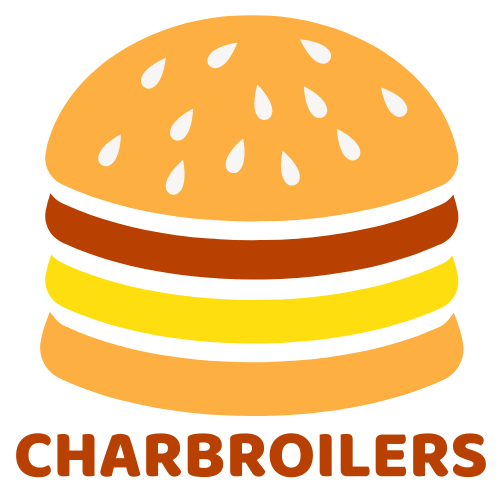
Food Truck Insurance Requirements: Essential Coverage Tips
Share
Getting your food truck on the road is one of the most exciting parts of this business, but navigating food truck insurance requirements can feel like hitting a wall of legal jargon. It’s tempting to put it off, but trust me on this: your insurance is just as vital as the ingredients in your best-selling dish.
Let’s cut through the confusion. There are three core policies every single food truck operator needs to have, no exceptions: Commercial Auto, General Liability, and Product Liability insurance. Think of these as the non-negotiable foundation for running your business legally and safely.
Your Quick Guide to Food Truck Insurance Essentials
Forget thinking of insurance as just another bill. It's the safety net that keeps you in business when things go wrong. A single fender bender, a customer tripping near your window, or a bad batch of ingredients could easily spell the end for an uninsured truck. The first thing to get straight is that your personal auto policy is completely useless here; it won't cover a vehicle used for business. You absolutely need commercial policies built for the unique world of mobile food.
This guide will break down why insurance isn't just about checking a box for the health department—it’s your primary defense against financial ruin.
Why Is Insurance Non-Negotiable?
Running a food truck means juggling multiple risks at once. You’re maneuvering a heavy commercial vehicle through traffic, you’re serving food directly to the public, and you're operating expensive, hot equipment in a very small space. Each one of these activities is a potential source for a costly accident or a lawsuit that could wipe you out.
A solid insurance portfolio is the bedrock of any sustainable food truck business. It turns potentially catastrophic losses into manageable, predictable expenses, freeing you up to focus on what you do best: making amazing food and connecting with customers.
The image below really brings home why getting proper coverage from day one is so critical.
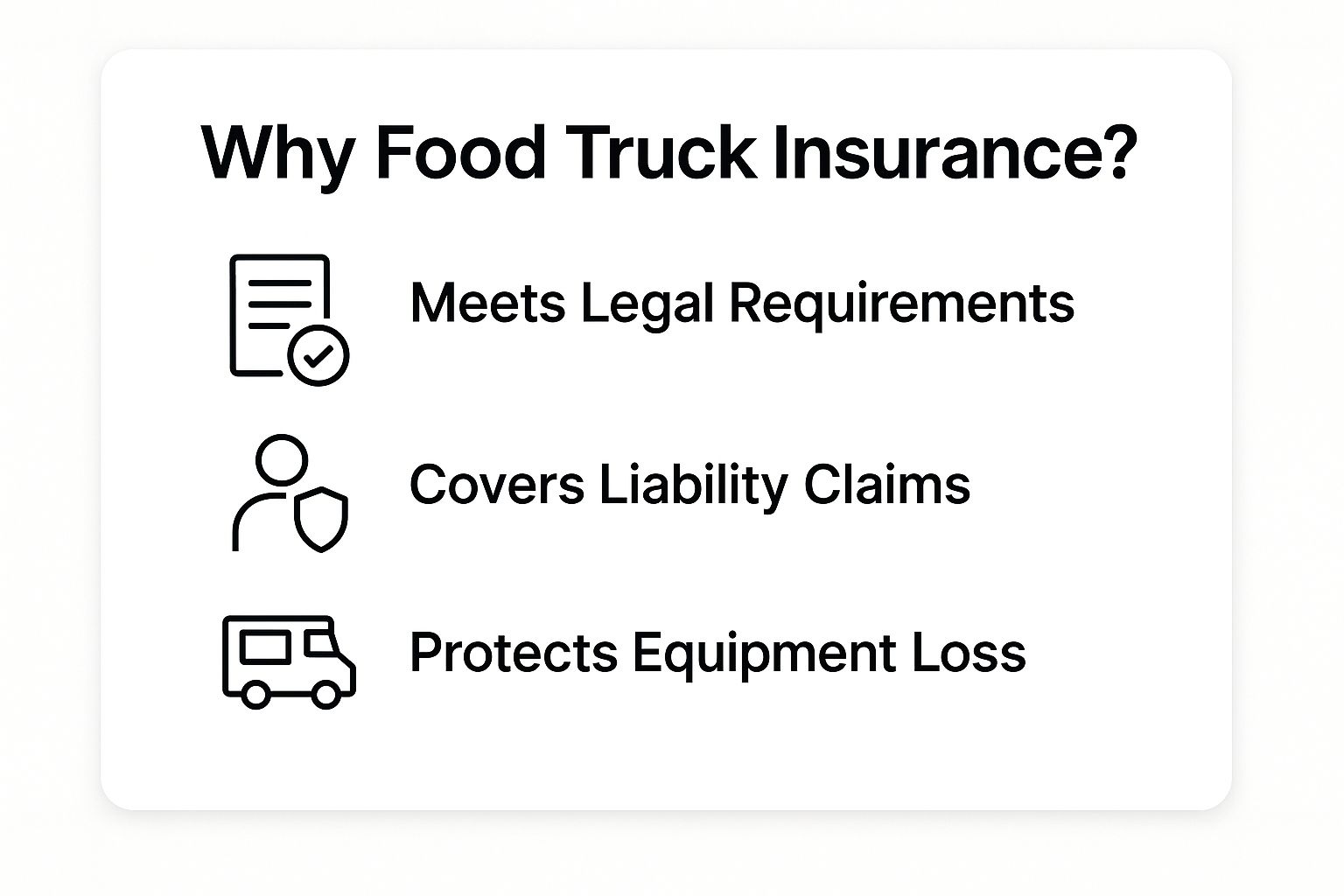
As you can see, it boils down to three simple things: meeting legal requirements, covering your liability, and protecting your expensive gear.
The Foundation of Your Coverage
The core policies required by most states, cities, and event organizers create a protective shield around your entire operation. While the specific dollar amounts can vary from place to place, a few fundamentals are nearly universal. In fact, when you look at food truck insurance requirements in any major city, you'll consistently see commercial auto, general, and product liability as the bare minimum to operate.
It’s no surprise that industry data shows around 75% of food truck operators carry both commercial auto and general liability policies, seeing them as a fundamental cost of doing business. While insurance protects your truck and your liability, the equipment inside is a massive investment on its own. Protecting your high-quality charbroilers and other gear is a key part of managing your risk. For a deeper dive into outfitting your kitchen, check out our guide on essential food truck cooking equipment.
To make it crystal clear, I've put together a table that breaks down the foundational policies you'll need to secure before you serve your first customer.
Core Insurance Policies for Food Truck Operators
This table outlines the absolute must-have insurance policies for any food truck. Understanding what each one covers and why it's required is the first step toward building a secure business.
| Policy Type | What It Covers | Why It's Required |
|---|---|---|
| Commercial Auto | Accidents involving your truck, including liability for injuries and property damage. | Required by law to operate a business vehicle. Personal auto policies will deny claims for commercial use. |
| General Liability | "Slip-and-fall" accidents, damage to a customer's property, and advertising injury claims. | Almost always mandated by event organizers, commissary kitchens, and city health departments to protect the public. |
| Product Liability | Claims of foodborne illness or allergic reactions from the food you serve. | Absolutely essential for any business selling food. It shields you from the most common and costly food-related lawsuits. |
Getting these three policies in place is your ticket to entry. They give you the peace of mind to fire up the grill and focus on growing your business, knowing you’re protected from the most common risks you'll face on the road.
Breaking Down Your Core Insurance Policies
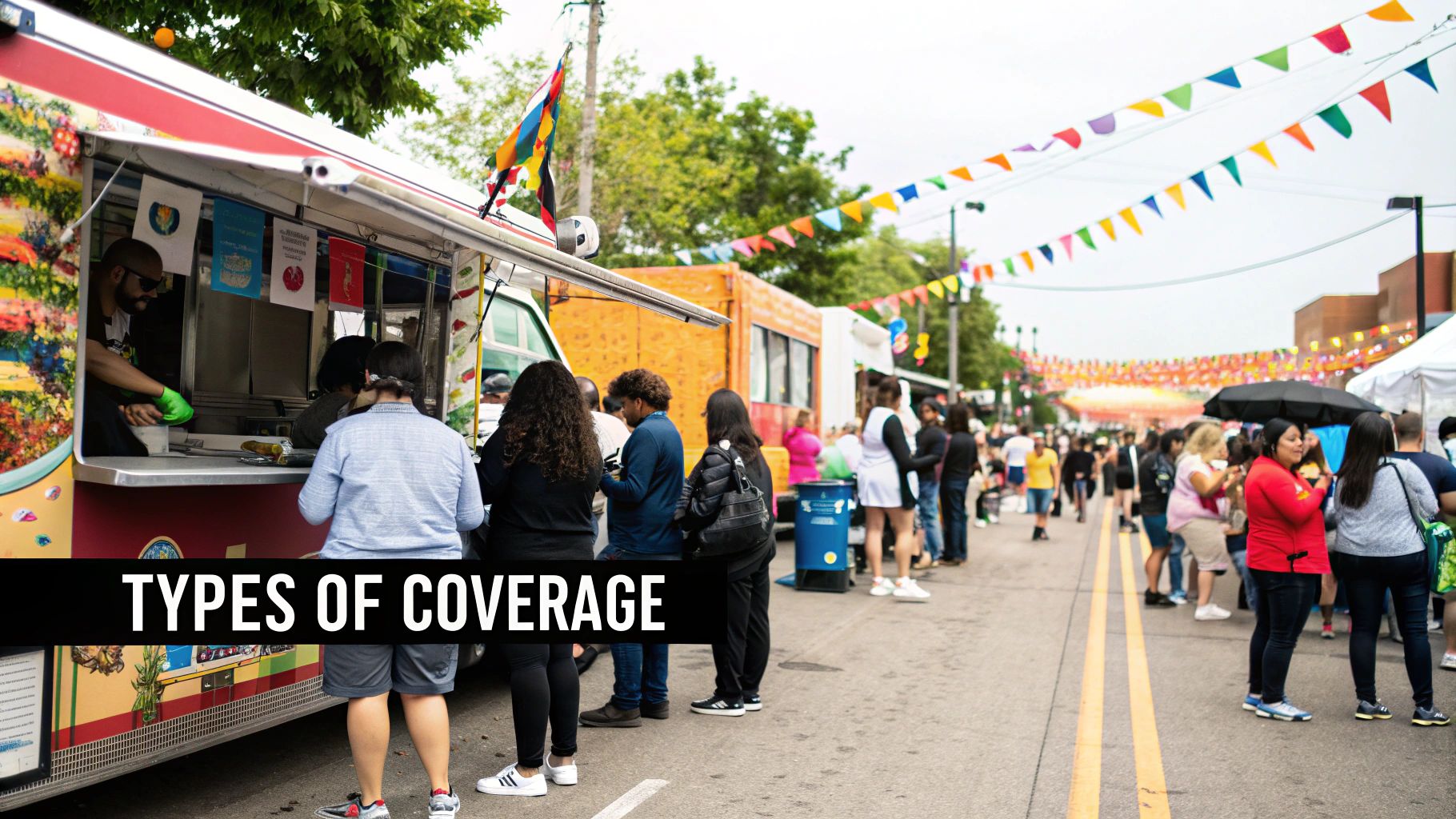
When you're buying insurance for your food truck, you're not just checking a box. You're building a financial fortress around your business. I find it helpful to think of it as a multi-layered safety net, where each policy is a different layer designed to catch a specific type of disaster. Let's walk through the three foundational policies that make up the core of your food truck insurance requirements.
These aren't just good ideas; they're the absolute bedrock of a legal and resilient business. They cover the most common—and most financially crushing—incidents you can face as a mobile food vendor. One bad day without them could slam the service window shut for good.
Commercial Auto Insurance: Your Truck on the Move
Let's start with the most obvious one: Commercial Auto Insurance. It seems straightforward, but there’s a critical detail new owners often miss. This policy protects your vehicle specifically because it’s a business asset, not just your personal ride.
Here’s the hard truth: your personal auto policy will not cover you if you get into an accident while working. Driving to a festival, picking up supplies from the wholesaler, even just moving the truck from the commissary kitchen—if you’re doing it for the business, your personal insurance company will deny the claim. That leaves you holding the bag for every penny of the damages.
A solid Commercial Auto policy includes:
- Liability: This covers injuries to other people or damage to their property when you're at fault in an accident.
- Collision: Takes care of repairs to your own truck after a crash, no matter who caused it.
- Comprehensive: This is your protection against the unexpected—theft, vandalism, fire, or storm damage that happens when you're not even driving.
This coverage is for more than just accidents on the road. Think about a tree branch falling on your roof at an outdoor market or someone breaking in overnight. That’s what comprehensive coverage is for.
General Liability Insurance: Protecting Your Customers and Property
Next is General Liability Insurance, your frontline defense for accidents that happen around your truck but don't involve driving. This is the policy that event organizers, landlords, and commissary kitchens will always ask to see proof of, because it protects the public.
Picture this: a customer trips over a power cord you've run to a generator. Or a big gust of wind sends your menu board flying into a nearby car. These are the everyday risks that can quickly spiral into thousand-dollar lawsuits.
General Liability is often called "slip-and-fall" insurance, and for good reason. It covers bodily injury and property damage claims that stem from your business operations, shielding you from third-party claims that could easily bankrupt you.
This policy handles the mishaps unrelated to the food itself. For instance, if an employee accidentally knocks over a bucket of soapy water and ruins a customer's expensive handbag, General Liability is what would cover the replacement cost. It’s an absolutely essential piece of your food truck insurance requirements.
Product Liability Insurance: Shielding You from Food-Related Claims
Finally, we get to the policy that’s unique to our industry: Product Liability Insurance. While General Liability covers accidents around your truck, this one covers problems caused by the product you actually sell—your food.
This is your shield against claims of foodborne illness, allergic reactions, or even finding a foreign object in a dish. In the food business, these are serious and constant risks. You can have the most meticulous food safety practices in the world, but mistakes can still happen, and just as importantly, accusations can still be made.
Real-World Scenario: A family enjoys a meal at your truck. Later that day, their child has a severe allergic reaction. They claim you didn't disclose that your signature sauce contained nuts. Whether the claim has merit or not, you're now facing a legal battle. Product Liability Insurance is what pays for the lawyers and any potential settlement.
Many General Liability policies will bundle in Product Liability, but you must confirm this with your agent. Sometimes it’s sold separately or as an add-on. Operating without it is a massive gamble, especially when every item on your menu, from sizzling burgers on a gas charbroiler to your famous tacos, carries this risk.
Navigating Local and State Insurance Mandates
The core policies we’ve covered—Commercial Auto, General Liability, and Product Liability—are your starting lineup. They’re the non-negotiables. But where you park and serve your food introduces a whole new layer of rules you can't afford to ignore.
Think of it this way: food truck insurance requirements aren't a single, national rulebook. It's more like a patchwork quilt of local, county, and state regulations that can change dramatically just by crossing a town line. A policy that gets you a permit in Austin might not cut it in Houston. Every city, and sometimes every single event venue, has its own idea of what "covered" really means.
The Layers of Local Regulation
When you operate a food truck, you’re answering to multiple authorities, and each one has its own insurance demands. Missing even one can get you turned away from a sold-out festival or, even worse, hit with fines and a shutdown order.
You need to be ready to show proof of coverage to several different players:
- State Government: This is the baseline. They set the minimum commercial auto insurance you need just to legally drive on public roads.
- City or County Health Department: Their main concern is public safety, so they’ll often demand specific liability limits before they’ll even think about issuing you a health permit.
- Commissary Kitchens: Your home base kitchen will almost certainly require you to name them as an "additional insured" on your general liability policy. No certificate, no kitchen access. It's that simple.
- Event Organizers: Food truck rallies, music festivals, and private parties will have their own, often much stricter, insurance minimums to protect themselves from lawsuits.
This multi-layered system means you have to become a bit of a detective. The single most common mistake I see new owners make is assuming one Certificate of Insurance will work for every gig. It won't.
Finding Your Area's Specific Requirements
So, how do you cut through all this red tape? The trick is to be proactive. Don't wait until an event organizer rejects your application to find out your liability limit is too low. Start by making a checklist of contacts for every single area you plan to operate in.
Your local city hall or county clerk's office is the best place to start. Just ask them which department handles mobile food vendor permits. They'll point you in the right direction, and that department will have the official documents spelling out the exact food truck insurance requirements for their jurisdiction.
The most critical document you will need is a Certificate of Insurance (COI). This one-page document is your golden ticket, proving to landlords, health inspectors, and event coordinators that you have the correct coverage. Always have digital and physical copies ready.
While you're checking with the city, you should also be calling the commissary kitchens and event venues you hope to work with. Ask them to email you their insurance requirements. Getting it in writing prevents any last-minute surprises that could cost you a full day's revenue. Keep in mind, these legal requirements are just one piece of the puzzle. You'll also need a stack of other licenses and permits. You can get the full picture by reading our detailed breakdown of food truck permit requirements to make sure you've covered all your bases.
The Role of Event and Venue Mandates
Festivals and private gigs are often where the real money is, but they also set the highest insurance bar. The organizer of a big music festival might demand a $2 million general liability policy, even if your city only requires $1 million.
Why the huge difference? The event organizer is on the hook for the safety of thousands of attendees. They require those higher limits to make sure your policy is big enough to handle a major claim without dragging them into a legal mess. This is why you must get the event's insurance specs upfront. Your standard policy might need a temporary boost, called a rider or an endorsement, to meet their needs. If you don't check, you'll be stuck on the sidelines watching other trucks rake in cash from the hungry crowds.
Specialty Coverage Your Food Truck Might Need
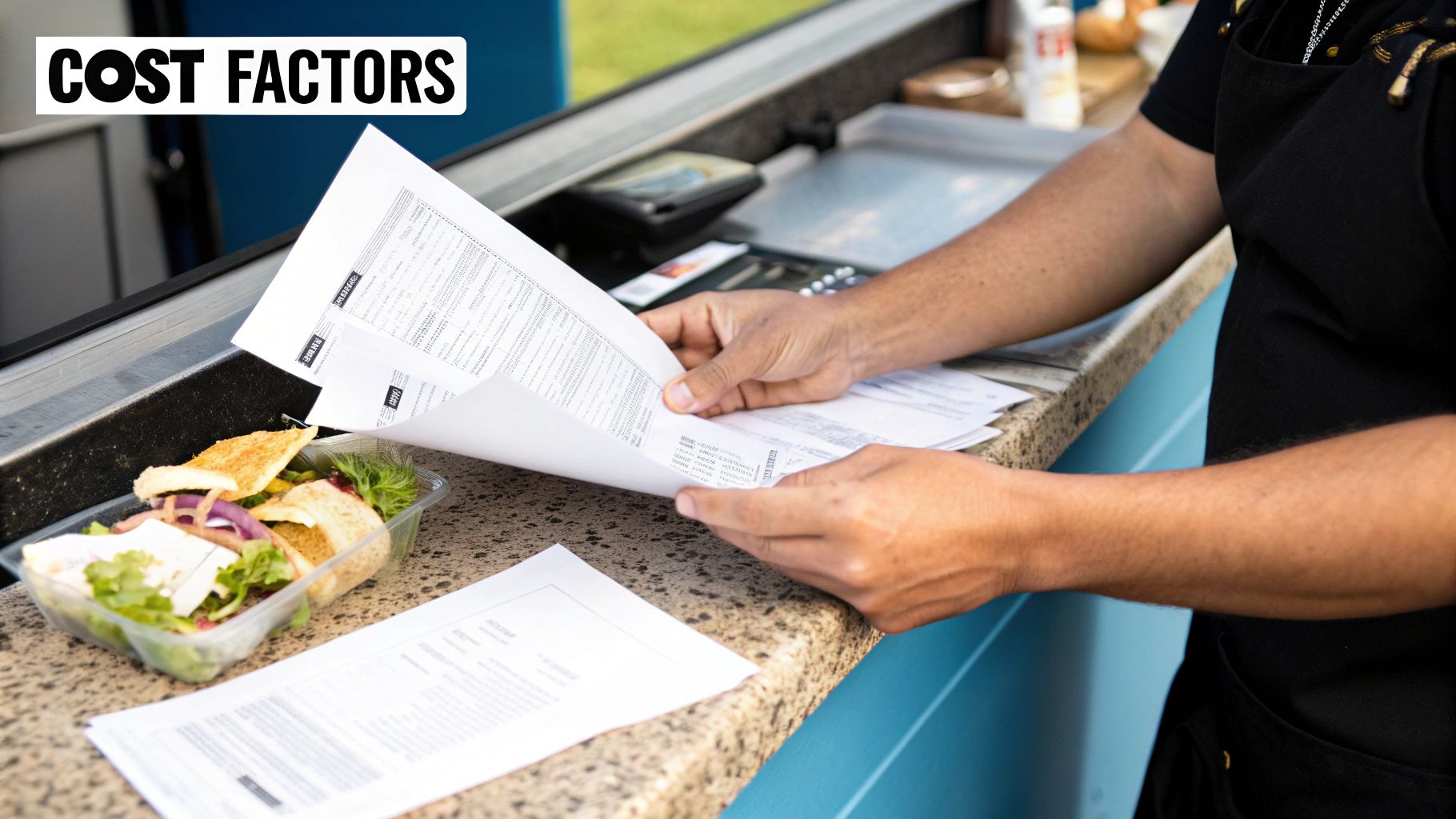
While your main insurance policies cover the big, obvious risks, they don't cover everything. Think of your General Liability and Commercial Auto policies as the foundation of your business's protection. But what happens when a unique, industry-specific problem pops up? That's where specialty coverage comes in.
These add-on policies are what separate the prepared food truck owners from the ones who get caught off guard. They fill the gaps left by standard insurance, protecting you from the kind of curveballs that could otherwise put you out of business for weeks, or even for good. Let's look at a few of the most important ones.
Workers' Compensation for Your Team
If you're a one-person show, you can gloss over this section for now. But the second you hire your first employee—even a part-timer to take orders on weekends—Workers' Compensation becomes non-negotiable. In nearly every state, it’s a legal requirement.
This policy is designed to protect both you and your crew. If an employee gets hurt or sick because of their job, Workers' Comp steps in to handle the fallout.
Let's say a cook gets a nasty burn from a hot grill, or someone slips on a wet spot inside the truck during a busy lunch rush. This policy would cover:
- Their medical bills and treatment
- A portion of their lost wages while they're recovering
- Any rehabilitation costs to get them back on their feet
Without it, you’d be on the hook for those expenses personally, not to mention facing some hefty fines from the state. Just as importantly, it shields your business from being sued by the injured employee, which is a massive relief.
Contents and Equipment Insurance
Your food truck is more than just a vehicle; it's a rolling professional kitchen. All that gear you've packed inside—the refrigerators, freezers, POS system, and that beautiful commercial charbroiler—can easily be worth tens of thousands of dollars. A standard commercial auto policy only covers the truck itself, not the expensive equipment inside.
That’s what Contents and Equipment Insurance (sometimes called Inland Marine coverage) is for. It protects all the business property that isn’t a permanent, bolted-down part of the vehicle.
Picture this: a fire breaks out overnight at your commissary. It damages your truck and completely destroys your new infrared charbroiler, your tablet-based POS system, and two commercial freezers. Your equipment insurance is what writes the check to replace those critical items so you can get back to serving customers.
This coverage is your safety net against theft, fire, vandalism, or other damage to your movable assets. Whether you're cooking with gas, electric, or infrared charbroilers, protecting that gear is a huge part of smart risk management.
Business Interruption Insurance
So, what happens if a busted engine or a small fire sidelines your truck for a month? You have zero income, but your bills—insurance premiums, loan payments, commissary kitchen rent—don't stop. This is the exact nightmare scenario that Business Interruption Insurance was created for.
This policy is a genuine lifesaver for a mobile business like a food truck. It replaces the income you lose and covers your fixed operating costs when a covered disaster forces you to shut down temporarily.
For example, a freak hailstorm smashes your truck's roof vents, causing water to pour in and short out your entire electrical system, including your essential commercial electric charbroiler. The repairs will take three weeks. During that time, Business Interruption Insurance can cover:
- Lost Profits: It pays you the net income you would have earned, based on your past financial records.
- Fixed Costs: It helps you keep up with rent, loan payments, and insurance premiums.
- Temporary Relocation: Some policies even help cover the cost of renting a substitute food truck to keep your business running.
This coverage turns a potentially business-ending catastrophe into a manageable bump in the road. It gives you the financial cushion to make repairs and get your service window back open without having to raid your personal savings. Adding these specialty policies to your plan is how you truly cover all your food truck insurance requirements.
How Your Business Operations Affect Insurance Costs
When you're mapping out your food truck budget, it's easy to focus on the big, shiny things like the truck itself or the cost of fresh ingredients. But insurance is one of those major, recurring expenses you can't afford to overlook. What exactly goes into that final premium? It’s not just a number pulled out of thin air. Think of insurers as oddsmakers—they’re calculating the real-world chances of you filing a claim based on the specific risks your business faces every day.
Everything from the city streets you park on to the food you sizzle on the griddle shapes how an underwriter sees your operation. The daily choices you make have a direct line to your insurance bill. Getting a handle on these factors is the key to managing your costs without ever compromising on the protection that keeps you in business.
Your Location and Route
Where you choose to park and serve is one of the biggest levers pulling your insurance rates up or down. A truck navigating the bumper-to-bumper chaos of downtown Dallas is a world away from one parked in a sleepy suburban office park. The risks of accidents, theft, or even vandalism are just plain higher in that dense urban environment.
Insurers dig into the geographic data to get a clear picture of that risk. They’re looking at things like:
- Crime Rates: If you're operating in an area with a reputation for theft, your comprehensive coverage premiums will reflect that.
- Traffic Density: The more cars around you, the higher the odds of a fender bender, which directly impacts your commercial auto rates.
- Weather Patterns: Setting up shop in a region known for hurricanes, tornadoes, or serious hailstorms means a greater chance of vehicle damage, and your premiums will adjust accordingly.
Your annual mileage also tells a big part of the story. A truck that sticks to a tight 20-mile radius is a much lower risk than one trekking across the state for weekend festivals. It’s a simple equation: more time on the road equals more opportunities for something to go wrong.
Vehicle and Equipment Value
This one is pretty straightforward. The more your truck and all the gear inside are worth, the more it will cost to insure them. It makes sense when you think about it. A brand-new, custom-outfitted rig valued at $150,000 represents a much bigger potential payout for an insurer than a seasoned, $40,000 used truck.
The same logic applies to all the expensive equipment that makes your kitchen hum. A setup loaded with top-of-the-line gear, including a high-capacity commercial gas charbroiler and multiple deep fryers, is a serious investment. Protecting those assets with Contents and Equipment insurance adds to your premium, but it's what guarantees you can get back to cooking after a major loss.
The core principle is simple: the more an insurer might have to pay out for a total loss, the higher your premium will be. This reflects the direct financial risk they are taking on by covering your assets.
How Your Menu Shapes Your Risk
What you’re cooking has a direct—and sometimes surprising—impact on your insurance costs. From an insurer's point of view, a food truck selling pre-packaged sandwiches and cold drinks is about as low-risk as it gets. But a truck running multiple deep fryers and open-flame equipment like a gas charbroiler? That’s a whole different level of fire risk.
This increased risk translates directly into higher premiums for your General Liability and property coverage. The more complex and fire-prone your cooking methods are, the more you can expect to pay. A smartly designed kitchen can help lower some of these risks. For some pro advice on that front, you can learn more about crafting an efficient and safe food truck kitchen layout in our detailed article.
The food truck insurance world has seen rates creeping up lately, driven by more frequent claims, soaring repair costs for specialized gear, and new ways of calculating risk. On average, food truck insurance premiums have climbed by 5-10% annually over the past three years in major markets. This trend really underscores why it’s more important than ever to manage the risk factors you can control.
Finally, your claims history is like a credit score for your business. A clean record with no past claims will get you the best possible rates. A history of accidents or liability issues, on the other hand, signals to insurers that you're a higher risk, and that will almost certainly lead to steeper premiums.
A Step-By-Step Guide to Getting Your Food Truck Insured
Knowing what insurance you need is one thing. Actually getting it is a whole different beast. The process can feel like you’re navigating a maze blindfolded, but if you break it down into a few clear steps, it’s much more straightforward. This is your roadmap from prep work to signing on the dotted line.
First things first: get your paperwork in order. Before you even think about calling an agent, you need to gather all your essential business documents. Think of it like prepping your ingredients before service—having everything ready makes the entire process smoother and faster.
Prepare Your Business Dossier
You'll want to build a complete profile of your food truck operation. An insurance agent needs a crystal-clear picture of what they’re being asked to cover.
Your packet should include:
- Business Details: Your legal business name, Employer Identification Number (EIN), and the address where you park the truck.
- Vehicle Information: The truck’s Vehicle Identification Number (VIN), year, make, model, and a detailed list of any custom modifications. Don't leave anything out.
- Driver Information: A list of every single person who might get behind the wheel, along with their driver's license numbers and driving records.
- Operational Plan: Details about your menu, especially if you’re using high-risk equipment like deep fryers or open-flame gas charbroilers. Also include your typical hours and the main cities or counties you plan to serve.
Find the Right Agent and Compare Quotes
Once your documents are lined up, it's time to find an insurance pro. Don't just go with the first result you find on Google. You need an agent or broker who actually specializes in the food service industry and understands the unique food truck insurance requirements.
A specialist agent knows the right questions to ask and can spot potential coverage gaps that a generalist might miss. Make sure you get quotes from at least three different providers. This allows you to compare not just the price, but also what's covered, the limits, and what's left out.
Never choose an insurance policy based on price alone. A cheaper plan might look good upfront, but it could have critical exclusions or low limits that leave your business dangerously exposed if something goes wrong. Always read the fine print.
Review and Finalize Your Policy
After comparing your quotes, take a hard look at the policy documents from your top choice. Meticulously check that all your expensive equipment is listed and valued correctly. Most importantly, confirm the liability limits meet the requirements for any big events, festivals, or commissaries you want to work with.
The food truck industry is booming, and insurers are taking notice. The global food truck insurance market is projected to jump from an estimated $415.7 million in 2025 to nearly $566.6 million by 2034, with more and more providers offering policies built specifically for mobile food businesses. You can find more insights on this growing market and the key players involved.
Once you’re confident the policy is the right fit, sign the papers, make your first payment, and get that Certificate of Insurance (COI). You'll need it everywhere you go.
Commonly Asked Questions About Food Truck Insurance
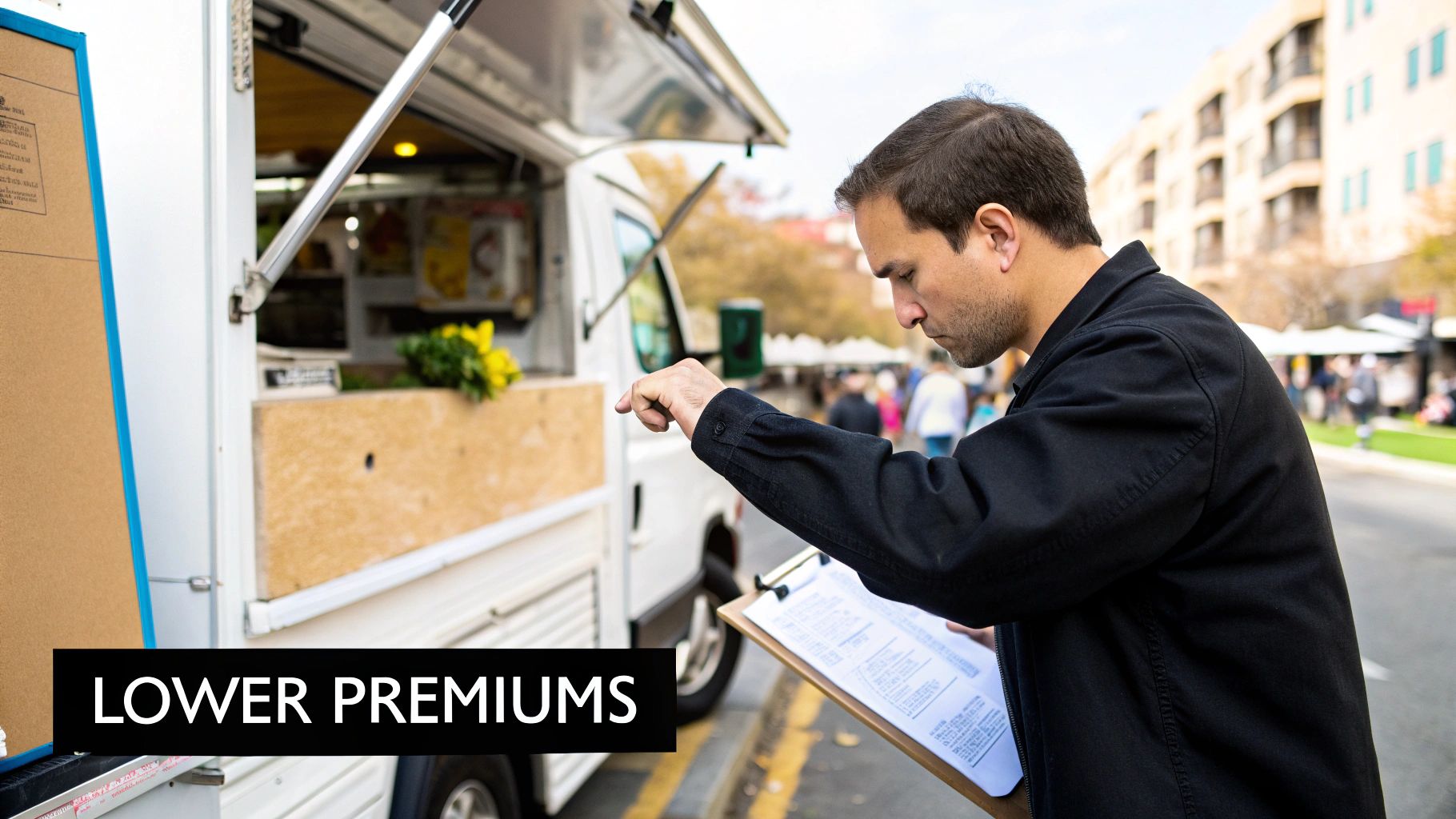
When you're diving into the world of food truck insurance requirements, a lot of practical, real-world questions pop up. Getting straight answers is the only way to operate your business legally and with some peace of mind. This section is all about tackling the questions I hear most often from new and veteran food truck owners alike.
Understanding these details helps you sidestep the common traps and make sure you're actually protected when it matters. Let’s get into the specifics that can make or break your mobile food business.
Can I Use My Personal Auto Insurance for My Food Truck?
I get this one all the time, and the answer is a hard no. A personal auto policy is built for your daily driver, not a commercial vehicle. If you get into an accident while driving to a festival or just picking up supplies, your personal insurer will almost certainly deny the claim. That leaves you on the hook for all the damages.
Your food truck is a commercial vehicle, plain and simple. It legally requires a commercial auto insurance policy. These policies are designed specifically for business use, offering much higher liability limits and the kind of protection you actually need on the road.
How Much Does Food Truck Insurance Typically Cost?
The cost of food truck insurance swings pretty wildly depending on your specific operation. That said, most owners can expect to pay somewhere between $1,200 to over $3,000 annually for a solid, basic package of the essential coverages.
Your final premium is a direct reflection of your business's risk profile. Key factors that move the needle include your state and city, the value of your truck and all that expensive equipment inside, your driving record, your claims history, the type of food you serve, and the coverage limits you choose.
What Happens If I Operate My Food Truck Without Insurance?
Running your truck without the legally required insurance is a massive gamble, and the consequences are severe. You're looking at steep fines, the suspension of your business license and vehicle registration, and even potential legal action from your local city or county. It's just not worth the risk.
Even worse, imagine if an accident or a foodborne illness claim actually happens. Without insurance, you would be personally responsible for every penny of the damages, medical bills, and legal fees. A single incident could financially ruin you, wiping out both your business and your personal assets in the blink of an eye.
Your insurance protects your business, and the right equipment makes it thrive. At Charbroilers, we offer a wide selection of commercial charbroilers to take your menu to the next level, including powerful infrared, gas, and electric models. Visit us at https://charbroilers.com to find the perfect charbroiler for your restaurant or food truck kitchen.
